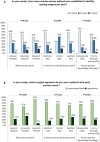An Italian National Survey on Ovarian Cancer Treatment at first diagnosis. There's None so Deaf as those who will not Hear
- PMID: 34149908
- PMCID: PMC8210549
- DOI: 10.7150/jca.57894
An Italian National Survey on Ovarian Cancer Treatment at first diagnosis. There's None so Deaf as those who will not Hear
Abstract
Objective: Epithelial ovarian cancer (EOC) is the most lethal gynecological malignancy, crucial prognostic factors are no gross residual disease and centralization of cases. To evaluate the centralization of EOC patients, we report the results of a survey that shows the daily management of EOC patients in Italy. Methods: A 49-items electronic unblinded survey assessing demographics, practice characteristics, current opinions and approach to managing advanced EOC at first diagnosis was sent both to general gynecologists (GG) and gynecologic oncologists (GO). Differences in frequency distribution of answers between gynecologists with different expertise were evaluated using Fisher exact test. Multivariable analyses were performed applying generalized linear models. Results: 84/192 (44%) GG and 108/192 (56%) GO from all Italian regions answered to our survey. GOs declared to perform fertility sparing surgery in early EOC more frequently than GG (p=0.002). GOs can perform a frozen section and have both a gynecopathologist and a dedicated general surgeon. 89% of GOs consider as "optimal debulking" no gross residual disease and 81% achieve this at upfront cytoreduction in more than 40% of patients. Use of neoadjuvant chemotherapy decreases in higher volume centers (p<0.001) while it is lower in the group of GOs than in the GGs group (p<0.001). Conclusions: EOC patients are still treated by GGs. GOs perform more upfront surgery and achieve optimal debulking in a greater percentage of patients than GGs. In Italy an adequate centralization of cases has not yet been achieved, and this may have detrimental effects on the quality of treatment.
Keywords: centralization; cytoreduction; epithelial ovarian cancer; gynecologic oncologists; survey.
© The author(s).
Conflict of interest statement
Competing Interests: The authors have declared that no competing interest exists.
Figures



References
-
- Torre LA, Bray F, Siegel RL, Ferlay J, Lortet-Tieulent J, Jemal A. A Global cancer statistics, 2012. CA Cancer J Clin. 2015;65:87–108. - PubMed
-
- Reggio Emilia, ItalyMangone L, Pinto C, I numeri del cancro in Italia, 2016. http://www.registri-tumori.it/PDF/AIOM2016/I numeri_del_cancro _2016.
-
- Lheureux S, Braunstein M, Oza AM. Epithelial ovarian cancer: Evolution of management in the era of precision medicine. CA Cancer J Clin. 2019;69:280–304. - PubMed
-
- Harries M, Gore M. Part I: chemotherapy for epithelial ovarian cancer-treatment at first diagnosis. Lancet Oncol. 2002;3:529–36. - PubMed
-
- Covens A, Carey M, Bryson P, Verma S, Fung Kee Fung M, Johnston M. Systematic review of first-line chemotherapy for newly diagnosed postoperative patients with stage II, III, or IV epithelial ovarian cancer. Gynecol Oncol. 2002;85:71–80. - PubMed
LinkOut - more resources
Full Text Sources
Medical

